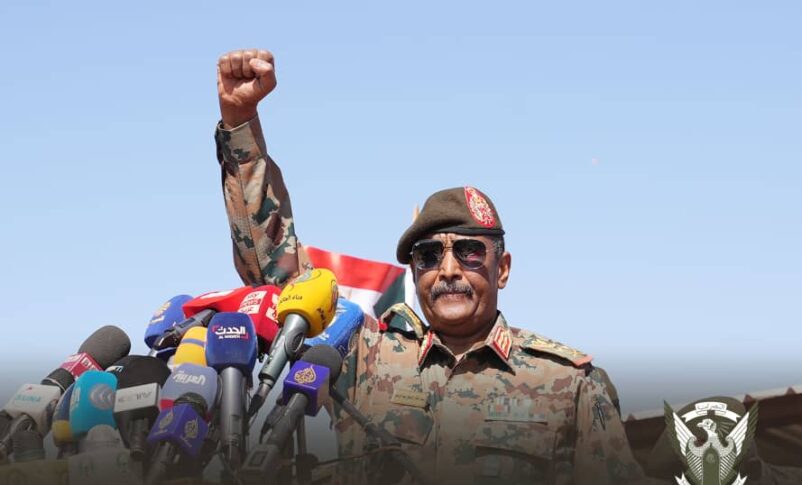Sudan analyst says SAF chance of victory is higher, but fears return of former regime

Commander-in-Chief of the Sudan Armed Forces, Lt Gen Abdelfattah El Burhan, giving a speech in 2022 (file photo: Sudan Armed Forces)
KHARTOUM – April 18, 2023
Journalist and political analyst El Jamil El Fadil said that the chances of victory in the ongoing clashes between the Sudan Armed Forces (SAF) and the Rapid Support Forces (RSF) are stronger for the SAF than the RSF, but warned of the disastrous consequences of an army victory.
In an interview with Radio Dabanga yesterday, El Fadil explained that a victory of the SAF would allow the Islamist movement to return to power, creating a situation even more difficult than it was before April 11, 2019, when the Islamist regime of dictator Omar Al Bashir was ousted after 30 years in power.
“The army and the Islamic Movement will resort to settling scores with the forces and parties that emerged after the revolution and overthrew the National Congress Party regime.”
The high ranks of the army largely consist of a loyal clan of Islamist Al Bashir supporters. A common knowledge that RSF Commander Lt Gen Mohamed ‘Hemedti’ Dagalo has used to frame himself as a fighter for democracy against dictatorial Islamists (referred to as kezan* in Sudanese slang).
Given the fact that his RSF were set up by the ousted Al Bashir regime and were deployed to commit genocide in Darfur, his recent tweets and framing attempts have been called hypocritical by many Sudanese.
On the ground, the RSF have already been accused of looting, rape, and embedding themselves in residential areas, using civilians as human shields.
The chances that the battle will be resolved in the RSF’s favour are weak, El Fadil estimates. Even if it would emerge victorious, Hemedti would face problems. “If Hemedti wins, he will find himself forced to accept the waiver of power and exit from the military to enter the political stage. This option, however, cannot be trusted.”
‘The best option for the Sudanese in this war is that the two sides weaken each other’
He said that “the best option for the Sudanese in this war is that the two sides weaken each other, which will contribute to the success of the civil democratic transition”. If both the RSF and SAF face heavy losses, the revolutionaries might have a better position to push for a democratic transition.
However, El Fadil also warned that “this scenario will surely lead to a prolongation of the war and the harm caused to civilians.”
Anti-military sentiments
Amidst the escalation of the tensions between the SAF and RSF, most Sudanese parties and revolutionary groups condemn the behaviour of both forces and call for an immediate end to all violence.
The secretary-general of the National Umma Party (NUP), El Wasig El Bereir, said that the plans of the affiliates of the former Al Bashir regime have succeeded in dragging the country into bloody military confrontations.
He said that the NUP is working with all its capabilities and relations to stop this war. “We are communicating with the two parties and the regional and international community to stop the fighting immediately.”
The Arab Socialist Ba’ath Party also condemned the use of military force to resolve differences between the army and the Rapid Support Forces.
Adel Khalafallah, the spokesperson for the party, told Radio Dabanga that he regretted the parties’ failure to respond to local and international efforts to stop the fighting.
He called on the forces of the revolution to condemn the war and call for an immediate cessation of the war.
‘For years now we have been demanding that the armed forces return to their barracks and RSF is dissolved’
Member of the Khartoum Resistance Committees El Fateh Hussein told Radio Dabanga that the resistance committees indeed call for an immediate end to the fighting.
“For years now we have been demanding that the armed forces return to their barracks and RSF is dissolved.”
* Kezan, or kizan, is a pejorative nickname used by many Sudanese to refer to Islamist loyalists to the regime of Omar Al Bashir (1989-2019) and who enjoyed far-fetching privileges during his rule. The word is the plural of koz which means ‘wooden or iron mug’. The nickname is based on a description the Islamic Brotherhood called themselves, when the founder of the group, the Egyptian Hasan El Banna, said “Religion is a sea, and we are the mugs that draw from it”.











 and then
and then